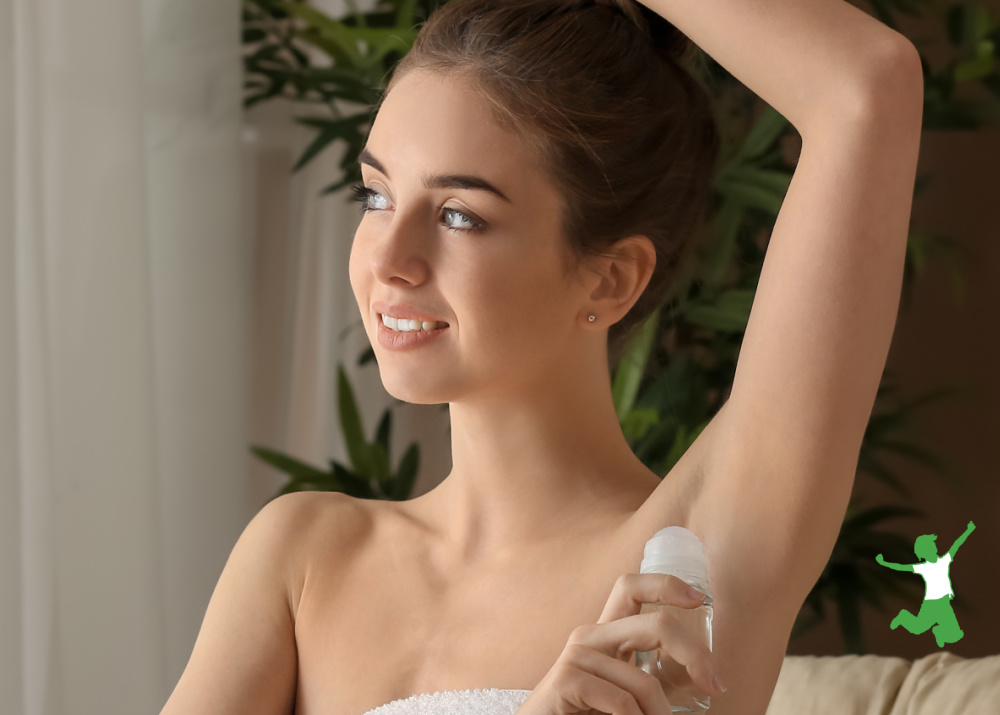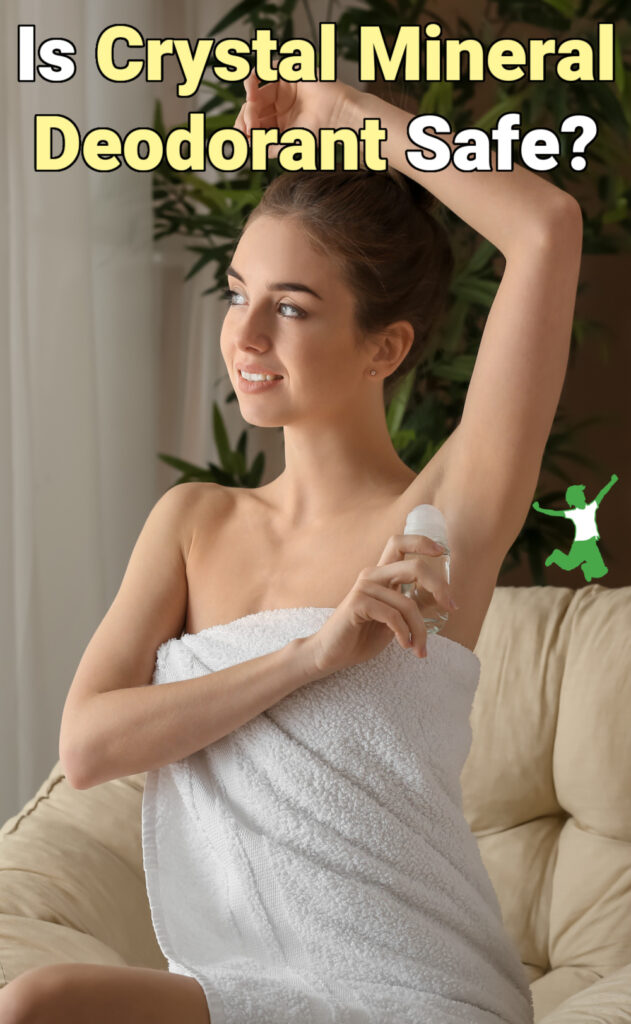Examination of whether crystal mineral deodorant rocks, sticks, stones or sprays are truly safe for regular use in adults and children.

Deodorant is typically one of the first products that people replace when going green and nontoxic with their personal care routine.
To that end, crystal mineral rocks (and sprays) are one of the more popular “natural” alternatives many people consider.
Containing only a single ingredient, potassium alum, crystal mineral deodorants definitely work to reduce perspiration. They also are anti-microbial, which discourages the growth of bacteria and the development of body odor.
My Experience with Crystal Mineral Deodorant
I confess that I bought a mineral rock deodorant roughly 25 years ago.
At the time, I was attempting to figure out which natural deodorants worked best as an alternative to toxic store deodorants containing aluminum, parabens, triclosan, hormone-disrupting fragrances, and other unhealthy substances.
I knew that I didn’t want to put these chemicals on my skin…particularly the thin skin of the armpit area which is very near the lymph nodes and breast tissue.
But, what I didn’t realize at the time is that “natural” deodorants can have sneaky toxins in them too.
The potassium alum in the crystal mineral deodorant seemed safe enough. Other brands listed only one word…”alum”.
One ingredient, no fragrance, and besides, potassium is healthy, right?
I used it for a few days, but that nagging feeling that something wasn’t quite right kept popping back into my head.
What does that “alum” word really mean?
What is “Alum”?
As it turns out, the “alum” or potassium alum in crystal mineral rocks and sprays has many different names. Here is the list of synonyms: (1)
- Alum
- Potassium Alum
- Alum Potassium
- Aluminum Potassium Salt
- Aluminum Potassium Sulfate
- Dodecahydrate Sulfuric Acid
- Exsiccated Alum
- Dodecahydrate
- Potassium Aluminum Sulfate
Mmmm, those other names are as safe sounding as “Potassium Alum” or “Alum” are they?
I decided to continue digging…
Marketing Spin
The conclusion I came to is that the use of the word “alum” instead of “aluminum” is purposely designed to mislead consumers.
Perhaps my conclusion is not true…
However, given the sketchy track record of the industry as a whole (talcum powder for your baby anyone??), I didn’t think that the use of a harmless-sounding name for the full word “aluminum” (which triggers neon-red flashing lights in the mind of a consumer) was coincidental.
Other marketing spin describes crystal rocks as “100% natural mineral salt” that are “eco-friendly and sustainable”.
Call the stuff whatever you like, the fact is that potassium alum is actually aluminum potassium salt.
Yes, it is naturally occurring.
And yes, it works and is safer than the aluminum salt used in store deodorants (aluminum chlorhydrate or aluminum zirconium tetrachlorohydrex GLY).
However, it is still an aluminum-containing substance that can put aluminum in your blood.
Am I going to put that on my skin?
No, I am not.
So, I threw away my crystal rock deodorant and never considered using it again.
But Wait! Potassium Alum is Listed as Safe by EWG!
Some of you may say that my assessment of Potassium alum was hasty and that this chemical is, in fact, quite safe.
For example, the Skin Deep database maintained by the Environmental Working Group lists alum as a 2 on a toxicity scale of 1-10. (1)
That is an excellent score…it even gets a green color next to the ingredient name.
However, if you look at the aluminum in toxic store deodorants that contain Aluminum Zirconium Tetrachlorohydrex GLY or Aluminum Chlorohydrate, these chemicals don’t score much worse on the EWG toxicity scale…only 3-4 out of 10. (2,3)
Note that aluminum is a common toxin found in breast cancer tissue removed by mastectomy. Aluminum is also linked to brain degenerative conditions like Alzheimer’s Disease. (4,5)
The fact of the matter is that aluminum on the skin…even ingested…is not considered such a big deal by those in the industry.
Consider that sliced and shredded cheese contains aluminum salts too. Worse, it is an unlabeled additive because it is an “industry standard”.
See this pattern of hiding aluminum from consumers either with semantic tricks or conveniently leaving it off the ingredients list?
If you dig a bit on the EWG Potassium Alum page to look at the actual research on it, you quickly notice that “alum” is ranked low on the toxicity scale, NOT because it is actually proven to be nontoxic, but because there aren’t many studies on it.
Big difference!
What Little Research There is on Alum is Ominous
If you dig a bit more into Potassium alum, you discover that the small amount of research on this substance is far from comforting.
It is listed as a moderate risk for non-reproductive organ system toxicity.
This appears to be due to its listing within the Environmental Canada Domestic Substance List: (6)
- One or more animal studies show alum causes tumor formation at high dose
- Alum is suspected to be an environmental toxin and be persistent or bioaccumulative
Thus, while potassium alum may be Generally Recognized as Safe (GRAS) by the FDA, Canada has a different perspective on the matter. (7)
And, please remember that GRAS status from the FDA doesn’t mean much … many toxic and aluminum-containing substances are listed as GRAS. (8)
Should You Use a Crystal Mineral Deodorant?
There is no doubt that the information on whether crystal mineral deodorant “rocks”, “stones”, sticks and sprays are safe is conflicting.
However, digging into the details led me to conclude that at this time, there simply isn’t enough data to support slathering it on your delicate underarm skin day in and day out.
I certainly would not be letting my children use them!
There are far safer deodorants to use, so why take the chance?
Here are the brands of deodorant our family currently uses to give you some idea of what to look for in a truly safe, effective product.

(1, 6) Potassium Alum
(2) Aluminum Zirconium Tetrachlorohydrex GLY
(3) Aluminum chlorhydrate
(4) Aluminium in breast tissue – a possible factor in the cause of breast cancer
(5) Surviving in the Aluminum Age
(7) Potassium Alum. Generally Recognized as Safe (GRAS)
(8) GRAS Database







Hi Sarah,
Does your family still use the Pretty Frank deodorant? There is zinc oxide in the ingredients, and I can’t find anywhere that says it’s non-nano. Is that something to be concerned about?
Pretty Frank has, sadly, gone out of business. We stocked up before the company closed, so I don’t have any other brand to suggest right now except this one. https://www.thehealthyhomeeconomist.com/ozonated-deodorant/
I’m shocked by what I’ve read. I’ve been using this deodorant for the past few years. Now I’ll try to make sense of it and find an alternative. It’s a good thing I didn’t use it every day. When I’m at home, I try not to use anything and wash up more often.
We use Everpure 100% alcohol to armpits every few days. Sometimes Vodka (less percentage of alcohol).
What is your opinion?
I would suggest witch hazel instead.
As a manufacturer of organic deodorants we had the “crystal”styles stones tested by Stone Group Laboratories in August 2011, it was determined in Raman spectroscopy, that the product is aluminum ferric sulfate. We also notified and sent the EWG group the 3rd party report. It was also brought to our attention that one of the crystal stone companies were donating a portion of sales to the EWG and other breast cancer groups. The acceptance of money from a company without clinical products testing appears unethical.
Our company Herbalix Restorative in 2009 sponsored a WIRB clinical using thermography to trace the lymphatic movement in women with fibrous breast using Thermo imaging. The association with blockage in the axilla (armpits) and the use of antiperspirants/crystal style deodorants further restricts extra cellular waste in breast to become stagnant and lacks lymphatic flow to the axilla. Breast pain is a early sign. Over time many individuals using these products can result in the inability to produce underarm sweat which can lead to other connected organs to “back flow”, thyroid, gums, brain.
These products need to be scientifically 3rd party tested for the public instead of heavy handed market ing. They indeed alter the body function which should be marketed as buyer beware.
This is shocking. Thank you so much for sharing this information Michael!
Great topic and article! I recently found this brand https://nandisnaturals.com/. I would love to know what you think?
Wow, that product looks great! Thank you for sharing!